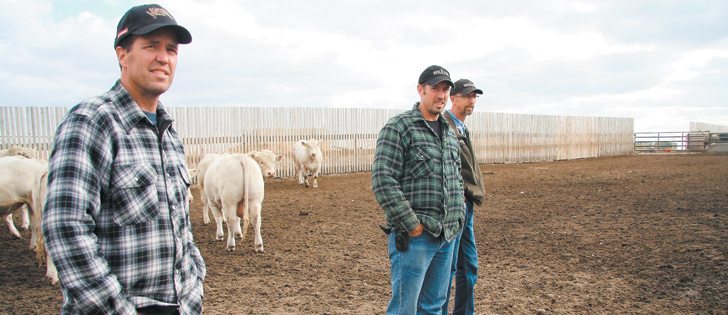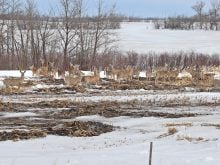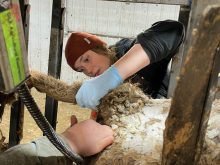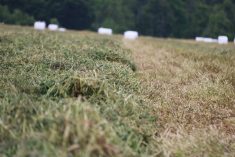Rolled compacted concrete is easier to install than regular concrete but provides a rough, hard surface that is durable
PICTURE BUTTE, Alta. — Feedlot operators in southern Alberta are testing new flooring material in cattle pens that shows promise in addressing muddy conditions.
Rolled compacted concrete is a blend of traditional concrete ingredients but in different ratios, sometimes including fly ash, and mixed using less water. It can be poured and compacted in pens without need for forms, rebar or extensive finishing.
The result is a rough, hard surface that is standing up well to cattle activity and pen cleaning.
Ed Stronks, who owns a 25-pen, 6,000 head feedlot near Picture Butte, Alta., first tried rolled compacted concrete in 2011 and has since installed it in all but six pens.
Read Also

Feds propose overhaul of chronic wasting disease control program
Chronic Wasting disease control program getting updated by Canadian Food Inspection Agency with feedback encouraged from producers.
“We started by doing 60 feet behind the feed pad apron. We were thrilled with the results there, so then we went back in and finished those pens except for the bedding pile,” he told a Feb. 9 meeting organized by Alberta Agriculture and Lethbridge County to discuss options for improved pen floors.
The new surface has eliminated the muddy conditions that can occur in feedlots, particularly in spring when the clay base can break down. Deep mud is difficult for cattle to navigate, which reduces productivity and affects health.
“The animal welfare issues were probably as big as anything,” said Stronks.
“When you get the breakup in spring conditions and the cattle are punching through that layer and up to their bellies … we had some extremely wet springs in a row and it seemed like our sub-bases got saturated and they never dried out in the summer. The next year, you’ve got the same problem.
“It was really hard on animal performance. It’s hard on employees checking in those conditions. It’s hard on cattle. We don’t feel good when we’re watching cattle in those conditions. There has to be a better way.”
Stronks said he is pleased with the durability of the pen floors. He and crew initially poured the product themselves, and Stronks estimated it cost about $1.50 per sq. foot.
After that he bought commercial product, with an estimated cost of $2 to $2.25 per sq. foot. Installation is a matter of dumping the product from trucks and leveling it off.
“It’s really that simple. You don’t over-think it a whole bunch more than that.”
He put down eight inches of the concrete and said it is holding up well. The surface is covered with manure in a matter of days, and he hasn’t seen any issues with cattle traction.
“It’s changed how we manage our feedlots, everything from the enjoyment of pen checkers working in those conditions to early access into the pens to deal with that stuff,” said Stronks.
At least five other feedlots in the region have also installed rolled compacted concrete flooring in some or all their pens.
George Lohues, co-owner of Coyote Flats Charolais near Coaldale, Alta., said rolled compacted concrete was put into six pens last summer.
“We love it. It’s met all of our expectations. It’s a durable hard surface and the cattle seem to perform well on it.”
Lohues said the feedlot has a good clay liner, but it often broke down with spring moisture and had to be replaced.
Spring-like conditions in southern Alberta in February have allowed him and his brothers to drive tandem trucks into rolled compacted concrete pens for cleaning.
“I think it’s going to spread the time that we have to clean the pens throughout the winter more, take advantage of chinooks and so on,” said Lohues.
Cody Metheral, an intensive livestock operations extension specialist with Alberta Agriculture, said observational studies have been done on rolled compacted concrete flooring in feedlots, and more in-depth study is planned.
Ike Edeogu, also of Alberta Agriculture, said he has applied for grant funding to explore its merits in terms of durability, strength and economics.
Contact barb.glen@producer.com
















